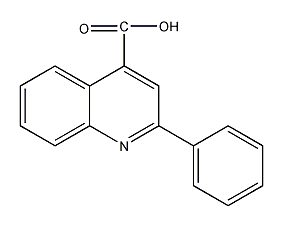2-phenyl-4-quinolinecarboxylic acid


Structural formula
| Business number | 03NK |
|---|---|
| Molecular formula | C16H11NO2 |
| Molecular weight | 249.28 |
| label |
2-Phenylcinchoninic acid, Cinchophen, aromatic compounds |
Numbering system
CAS number:132-60-5
MDL number:MFCD00006750
EINECS number:205-067-1
RTECS number:GD4025000
BRN number:192803
PubChem number:24851762
Physical property data
None yet
Toxicological data
Acute toxicity data:
Human oral LDLo: 214mg/kg
The man’s path is unknownLDLo: 74mg/kg
Rat orally LDLo :500mg/kg
Mice orally LDLo :1500mg/kg
Mouse abdominal cavityLD50: 200mg/kg
Mouse subcutaneous LD50: 350mg/kg
The path of the rabbit is unknownLDLo: 500mg/kg
Other multi-dose data:
Rat Sutra 口TDLo:2800mg/kg/7D-I
Ecological data
None yet
Molecular structure data
5. Molecular property data: 1、 Molar refractive index:73.70 2、 Molar volume(m3/mol) :194.5 3、 Isotonic specific volume(90.2K):540.7 4、 Surface tension(3.0 dyne/cm):59.6 5、 Polarizability0.5 10-24 cm3):29.22
Compute chemical data
1. Reference value for hydrophobic parameter calculation (XlogP): 3.4
2. Number of hydrogen bond donors: 1
3. Number of hydrogen bond acceptors: 3
4. Number of rotatable chemical bonds: 2
5. Number of tautomers: none
6. Topological molecule polar surface area 50.2
7. Number of heavy atoms: 19
8. Surface charge: 0
9. Complexity: 325
10. Number of isotope atoms: 0
11. Determine the number of atomic stereocenters: 0
12. Uncertain number of atomic stereocenters: 0
13. Determine the number of chemical bond stereocenters: 0
14. Number of uncertain chemical bond stereocenters: 0
15. Number of covalent bond units: 1
Properties and stability
basic properties
White or light yellow crystalline powder. Pink point 213-216℃. 1g of this product is soluble in about 400ml of chloroform; 100ml of ether; 120ml of ethanol, and is almost insoluble in water. It tastes slightly bitter and almost odorless. It is easy to change when exposed to sunlight.
Storage method
None yet
Synthesis method
Brief description of production methods
Isatin is prepared into a sodium salt, which is ring-opened to form sodium anthranilate, and then cyclized with acetophenone to obtain cinchofen sodium, which can be acidified with acetic acid or hydrochloric acid to obtain cinchofen
Purpose
Purpose
Antipyretics and analgesics. Used for acute and chronic arthritis, rheumatic pain, neuralgia, low back pain, gout, headache, etc.
SIZE: 9pt; FONT-FAMILY: Arial; mso-font-kerning: 0pt”>3.0 dyne/cm):59.6
5、 Polarizability0.5 10-24 cm3):29.22
Compute chemical data
1. Reference value for hydrophobic parameter calculation (XlogP): 3.4
2. Number of hydrogen bond donors: 1
3. Number of hydrogen bond acceptors: 3
4. Number of rotatable chemical bonds: 2
5. Number of tautomers: none
6. Topological molecule polar surface area 50.2
7. Number of heavy atoms: 19
8. Surface charge: 0
9. Complexity: 325
10. Number of isotope atoms: 0
11. Determine the number of atomic stereocenters: 0
12. Uncertain number of atomic stereocenters: 0
13. Determine the number of chemical bond stereocenters: 0
14. Number of uncertain chemical bond stereocenters: 0
15. Number of covalent bond units: 1
Properties and stability
basic properties
White or light yellow crystalline powder. Pink point 213-216℃. 1g of this product is soluble in about 400ml of chloroform; 100ml of ether; 120ml of ethanol, and is almost insoluble in water. It tastes slightly bitter and almost odorless. It is easy to change when exposed to sunlight.
Storage method
None yet
Synthesis method
Brief description of production methods
Isatin is prepared into a sodium salt, which is ring-opened to form sodium anthranilate, and then cyclized with acetophenone to obtain cinchofen sodium, which can be acidified with acetic acid or hydrochloric acid to obtain cinchofen
Purpose
Purpose
Antipyretics and analgesics. Used for acute and chronic arthritis, rheumatic pain, neuralgia, low back pain, gout, headache, etc.
